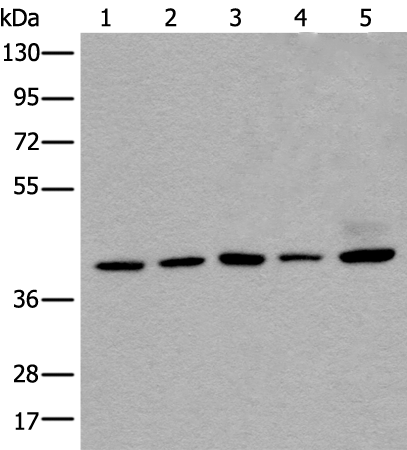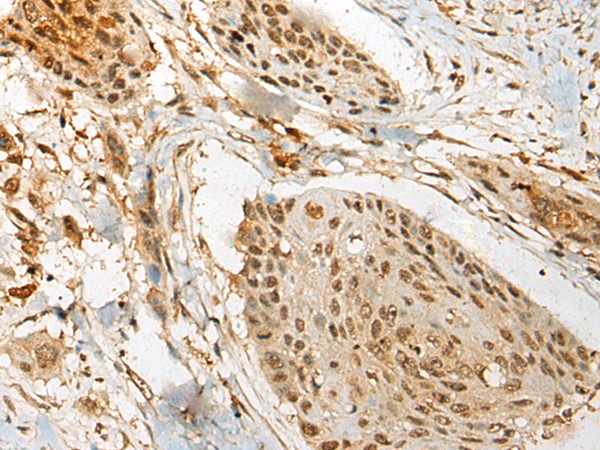

| WB | 咨询技术 | Human,Mouse,Rat |
| IF | 咨询技术 | Human,Mouse,Rat |
| IHC | 1/25-1/100 | Human,Mouse,Rat |
| ICC | 技术咨询 | Human,Mouse,Rat |
| FCM | 咨询技术 | Human,Mouse,Rat |
| Elisa | 1/5000-1/10000 | Human,Mouse,Rat |
| Aliases | Erb; ESRB; ESTRB; NR3A2; ER-BETA; ESR-BETA |
| WB Predicted band size | 59 kDa |
| Host/Isotype | Rabbit IgG |
| Antibody Type | Primary antibody |
| Storage | Store at 4°C short term. Aliquot and store at -20°C long term. Avoid freeze/thaw cycles. |
| Species Reactivity | Human, Mouse, Rat |
| Immunogen | Synthetic peptide of human ESR2 |
| Formulation | Purified antibody in PBS with 0.05% sodium azide and 50% glycerol. |
+ +
以下是3篇与ESR2抗体相关的文献及其摘要概括:
---
1. **文献名称**: *"Estrogen receptor β (ERβ) inhibits proliferation and invasion of breast cancer cells through regulation of the NF-κB pathway"*
**作者**: Zhao et al. (2018)
**摘要**: 研究利用ESR2特异性抗体(克隆号:PPZ0506)发现ERβ通过抑制NF-κB信号通路,降低乳腺癌细胞(MCF-7)的增殖和迁移能力,提示ERβ可能作为乳腺癌治疗的潜在靶点。
---
2. **文献名称**: *"Estrogen receptor β activation protects against Aβ-induced neurotoxicity by increasing autophagy in neurons"*
**作者**: Li et al. (2020)
**摘要**: 通过ESR2抗体(克隆号:14C8)验证ERβ在阿尔茨海默病模型中的表达,发现激活ERβ可增强神经元自噬,减少β淀粉样蛋白(Aβ)沉积,从而缓解神经退行性病变。
---
3. **文献名称**: *"Differential expression of estrogen receptor beta isoforms in human immune cells"*
**作者**: Phiel et al. (2015)
**摘要**: 使用ESR2抗体(克隆号:H150)分析ERβ在免疫细胞中的表达差异,发现ERβ1亚型在T细胞和单核细胞中高表达,并参与调控炎症反应,为免疫疾病研究提供依据。
---
4. **文献名称**: *"ERβ as a prognostic marker in ovarian cancer: A meta-analysis and immunohistochemical study"*
**作者**: Huvila et al. (2017)
**摘要**: 通过免疫组化(抗体:1D5)评估ERβ在卵巢癌组织中的表达,发现ERβ高表达与患者生存率改善相关,支持其作为卵巢癌预后标志物的潜力。
---
注:以上文献信息为简化示例,实际引用需核对原文准确性及期刊名称。
The estrogen receptor 2 (ESR2), also known as ERβ, is a nuclear receptor that mediates the biological effects of estrogen by regulating gene expression. It shares structural similarities with ESR1 (ERα) but differs in tissue distribution and functional roles. ESR2 is widely expressed in reproductive tissues, bone, cardiovascular and central nervous systems, and immune cells, playing key roles in cell proliferation, differentiation, and homeostasis. Its involvement in hormone-responsive cancers (e.g., breast, ovarian, prostate), metabolic disorders, and neurodegenerative diseases has driven research interest.
ESR2 antibodies are critical tools for detecting and quantifying ESR2 protein levels in research and diagnostics. They enable the study of ESR2 expression patterns, subcellular localization, and interactions via techniques like Western blotting, immunohistochemistry, and immunofluorescence. These antibodies help elucidate ESR2's context-dependent roles, particularly its contrasting or complementary effects to ESR1 in diseases. For example, ESR2 may act as a tumor suppressor in certain cancers, influencing therapeutic responses and prognosis. However, challenges persist in antibody specificity due to ESR2's multiple isoforms and post-translational modifications, which can lead to variability in experimental outcomes. Validated ESR2 antibodies remain essential for advancing studies on estrogen signaling pathways and developing targeted therapies for hormone-related conditions.
×